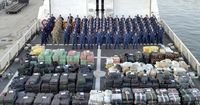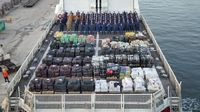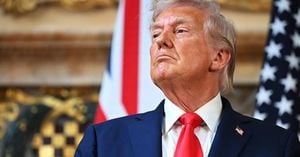On a sweltering Monday morning at Port Everglades, Florida, the U.S. Coast Guard made history. The crew of the Cutter Hamilton, joined by a flotilla of law enforcement and military partners, offloaded over 76,000 pounds of illegal drugs—an unprecedented haul that marks the largest single drug seizure in the Coast Guard’s 110-year existence. The staggering cache, which included approximately 61,740 pounds of cocaine and 14,400 pounds of marijuana, carries an estimated street value of $473 million, according to Coast Guard officials.
But the numbers only begin to tell the story. Rear Adm. Adam Chamie, commander of the Coast Guard’s Southeast District, didn’t mince words as he put the seizure into context. “To put this into perspective, the potential 23 million lethal doses of cocaine seized by the U.S. Coast Guard and our partners are enough to fatally overdose the entire population of the state of Florida, underscoring the immense threat posed by transnational drug trafficking to our nation,” Chamie said, as reported by Fox News and The Guardian. The math is chilling: with a lethal dose of cocaine as little as 1.2 grams, these drugs could have devastated communities across the country.
This massive operation, dubbed Operation Pacific Viper, was no solo effort. From June 26 to August 18, 2025, the Coast Guard, working side by side with the U.S. Navy, U.S. Customs and Border Protection’s Air and Marine Operations, the Royal Netherlands Navy, and multiple interagency units—including the Department of Homeland Security and the Joint Interagency Task Force—interdicted 19 drug-carrying vessels across the Eastern Pacific Ocean and Caribbean Sea. The drugs, seized far from American shores, were often found on so-called “go-fast” boats—speedy vessels favored by traffickers hoping to outrun the law.
Capt. John B. McWhite, commanding officer of the Hamilton, praised his crew’s relentless dedication. “This outstanding group of professionals achieved unparalleled results in our nation’s fight against transnational criminal drug organizations,” McWhite said at the Port Everglades news conference, as cited by Fox News. “The crew interdicted 11 go-fast vessels, detained 34 suspected drug traffickers, and seized a record 47,000 pounds of cocaine. The commitment and sacrifice of our deployed service members and their families, who forego time together for the protection of our nation, are to be celebrated.”
The operation’s reach was global. The 19 interdictions spanned international waters off the Galápagos Islands of Ecuador, the coast of Venezuela, Mexico, the Dominican Republic, Jamaica, and Aruba. On June 26, the Hamilton crew intercepted two vessels near the Galápagos, seizing more than 8,800 pounds of cocaine. Less than a month later, on July 23, they nabbed another 9,160 pounds near Socorro Island, Mexico. According to ABC News and BBC, about 80% of all illegal drug interdictions by the Coast Guard occur on the high seas, far from the U.S. coastline.
Technology played a pivotal role. The Hamilton’s onboard drone unit was instrumental in spotting many trafficker boats, giving Coast Guard teams the edge they needed to intercept and search the vessels before the drugs could make landfall. Maritime patrol aircraft also contributed, often identifying suspect vessels before boarding teams moved in for the bust.
All told, 34 suspected traffickers were detained during the operation, though authorities have not specified the total number of suspects from all interdictions. The seized drugs were offloaded from multiple Coast Guard vessels, but the Hamilton’s haul stood out as the largest single offload in history. The previous record, according to the Navy Times, was set in 2021 with 61,130 pounds of illicit drugs—making this year’s operation a clear leap forward in the fight against drug smuggling.
This record-breaking success is part of a broader push by the Trump administration to crack down on drug cartels and transnational criminal organizations. Operation Pacific Viper is just one piece of a larger strategy aimed at disrupting drug trafficking and human smuggling before these threats reach U.S. shores. President Donald Trump, who has made the fight against fentanyl and other deadly drugs a top priority, recently signed The Halt All Lethal Trafficking of Fentanyl Act in July 2025, strengthening prison sentences for fentanyl traffickers with strong bipartisan support in Congress. The president has argued that the illicit flow of fentanyl into the U.S. is a key reason behind his tariff threats against Canada, Mexico, and China.
Since January 2025, the Coast Guard has seized $2.2 billion worth of drugs heading for the U.S., a figure that highlights the scale and urgency of the problem. “These drugs fuel and enable cartels and transnational criminal organizations to produce and traffic illegal fentanyl, threatening the United States,” the Coast Guard statement warned, as reported by CNN and The Guardian. The agency emphasized that accelerating counter-drug operations in the Eastern Pacific Ocean is vital to disrupting the flow of cocaine and other bulk illicit drugs by sea.
The Coast Guard’s success has not gone unnoticed by policymakers. The Trump administration has pledged to overhaul the service, which is part of the Department of Homeland Security, by increasing its fleet and boosting its military workforce by at least 15,000 by the end of fiscal year 2028. With more than 43,000 active duty members, 8,000 reservists, and 30,000 auxiliary members, the Coast Guard is positioning itself as a formidable force in the ongoing battle against drug trafficking.
At Port Everglades, the mood was both triumphant and sober. Coast Guard officer Frank Marrano, speaking to reporters, reflected on the human side of the mission. “All of these interdictions, drugs—it is the result of four months of hard work that the crew has put in, not only the crew, all of our sister agencies and our partner nations. To be able to take positive steps to keep the United States safe from these drugs, it makes the difficult days worth it.”
While the record-breaking seizure is a clear victory, officials caution that the fight is far from over. The sheer volume of drugs intercepted in just one summer underscores the ongoing challenge posed by transnational criminal organizations. As Rear Adm. Chamie put it, “This represents a significant victory in the fight against transnational criminal organizations, highlighting our unwavering commitment to safeguarding the nation from illicit trafficking and its devastating impacts.”
With billions of dollars in drugs still flowing toward U.S. shores each year, the Coast Guard’s work is as critical as ever. For the crew of the Cutter Hamilton and their partners, this summer’s historic operation is a testament to what’s possible when determination, technology, and international cooperation come together on the high seas.





